Building our environments to be safe spaces for the people who enter them is important! Our learners took a pasuk (sentence) from Torah about building fences around our roofs as a jumping off point for a discussion about how we keep our bodies physically safe (Deuteronomy 22:8) as well as a pasuk from Pirkei Avot that tells us that knowing a lot of Torah and good things doesn’t matter if we don’t follow through from that knowledge to our actions (Pirkei Avot 3:11).
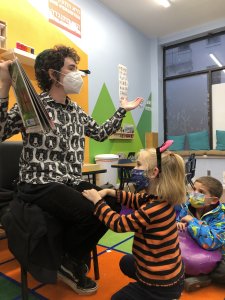
The Garinim (kindergarteners) had many thoughts about the types of rules created to help people keep each other’s bodies safe.
- At the park, if I stick my tongue out at someone, I get one more chance, and then if I do it again I have to go home. That’s a way that mom and dad are making me a safer person. It’s also actually helping keep people’s feelings safe because they might be sad if I stick my tongue out at them.
- When we’re inside we have to keep our masks up.
- We keep our bodies to ourselves. When we are outside in the alley we have to stay on the side of the star pole [that separates the rest of the alley from the parking lot].
- Listening to each other to follow directions.
- Listening to each other about the things our bodies need.
Another group of kiddos were inspired by the Pirkei Avot text and imagined how we can help our friends feel emotionally safe so that they are confident to share their talents. Here are some scenarios kiddos illustrated on white boards:
- If our friend is nervous to sing, we can start singing so that they don’t have to sing alone
- If a friend wants to perform on stage but is nervous, we could reduce the audience size and also make it more interactive so the person on stage isn’t the only person participating
- If there is a storm going on and a giant is outside and needs protection from the rain, but if the person inside the house is afraid of the giant, a monster can help them out and show them not to be afraid of the giant so they can come inside
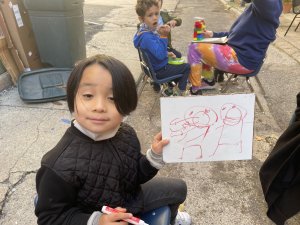
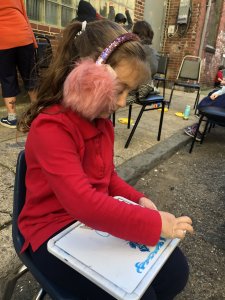
This Pirkei Avot text tells us particularly that if we embarrass a friend, we’re not helping to create olam haba (a better future). The Garinim have created art of what their personal olam haba might look like while we contemplated this big idea.
When is the future?
- The end of your life.
- Anytime between now and the end of your life.
- What you imagine when you’re a grown up.
What parts of the future can you imagine?
- What I’m going to do after I wake up tomorrow.
- What I do over the weekend.
- When I’m in middle school? That’s so old!
- My house when I’m a grownup will look like a dinosaur cave and have my parents, dog, and little brother living with me.
- My house when I’m a grownup will be a robot house and my parents and grandparents and a dog and a cat will all live there.
- My house will be a unicorn rainbow and everyone in Garinim will be invited to live with me.
What are some good things that we hope will continue into the future?
- My life
- God
- Fun dance moves
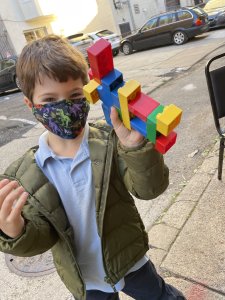
Shorashim (1st, 2nd, and 3rd Graders) considered what it takes to make a space feel safe. We started with physical attributes but then became more general. Some responses included:
- Made of soft materials
- Nowhere to fall
- No bats
- Climate resilience
- Curtains/privacy
- Stuffed animals
- People who are kind, and won’t do anything to hurt you
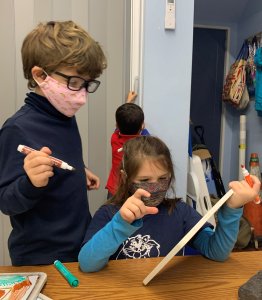
Kids saw some downsides about always being in the safest possible space, noting that it would feel lonely, or limit chances for ingenuity, and that sometimes they want to be brave, or go to Mars.
We also considered our obligation to make our spaces safe not only for ourselves but also for our neighbors. Kids insightfully brainstormed some things that might make some people feel more safe but others feel less safe:
- A stuffed animal that looks a little scary
- Dogs
- A rocking chair
- Police
One of the Shulchanot (table centers) for this week is to create dioramas or what they imagine their safe space to look like. First, kids drew their ideas and explained why it made them safe and how it made them feel, and then we went to building and creating!
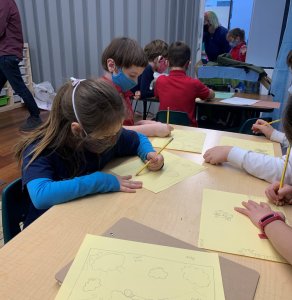
On Thursday, we reviewed the Pirkei Avot text and when asked the question, “if there’s a fence on the roof, can someone still fall off?” Many kids said, “No!” One kiddo pointed out that you can still fall off the roof with a fence if you try really hard, making the connection that we cannot control other people but we can try our best to keep them safe.
In Nitzanim (3rd, 4th, and 5th Graders), we started off the week with a modified version of red light-green light as a segue to our conversation about protecting our bodies and feelings. After a lot of laughs and some interesting competition, we reflected on how this game related to the text from Deuteronomy about building a fence around your roof to protect others and yourself. Here were some reflections:
- The protector in the game acted as a fence
- A fence can protect you
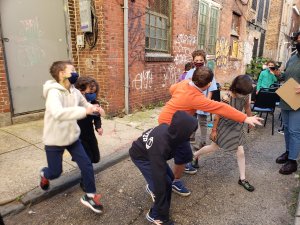
We also reflected what makes us feel safe:
- Being alone in a quiet place
- Being with parents
On Wednesday, Nitzanim put on their writing caps to create stories together. With only one line of the story visible, kiddos added their own part of the story before passing it to the next person. Together, we came up with some interesting and silly tales! We then explored the Pirkei Avot text about embarrassing a friend.
Why might embarrassing our friends not help create a better future? Here are some of our thoughts:
- If you make someone feel bad, this person might not feel confident enough to help create a better future
- Feeling embarrassed can feel like you’re being attacked on the inside
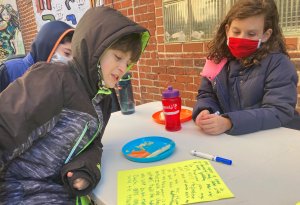
As we continue painting our mural, we have also gotten a start on recording audio! Kiddos are taking different roles in our audio production and we can’t wait for it to be put together.
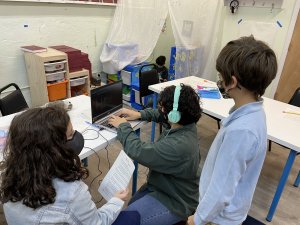
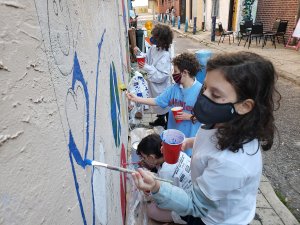
We are very excited for the Nitzanim showcase and we are beginning to wrap up our Love Your Neighbor unit! Can’t wait to see what interesting insights our learners have next week!
